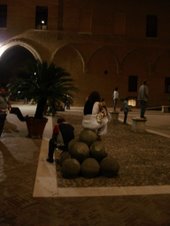Bella Ciao
It's a great moment in the history of the world right now: women are going to be the positive change in the world. And we're going to do it with love. After all, it's women who pay back their loans and who are creating mini-revolutions in peripheral nations. It's women who have been silenced but who are beginning to spotlight the value different kinds of discourses, and present new kinds of dialogues. Women are the innovators: this is true in language use in most societies. It's my understanding that postmodernism shares many parallels with historically feminine ways of conceiving the world: is it not true that there are many truths, that each person has access to multiple ways of conceiving of the world? Ursula K. Le Guin recounts an experience she shared with a group of women discussing theory. One woman said, amidst arguing and verbal jabbing, "Offer your experience as your truth," to which the women markedly shifted their style of dialogue. Le Guin remembers
"When we started talking again, we didn't talk objectively, and we didn't fight. We went back to feeling our way into ideas, using the whole intellect and not half of it...not claiming something: offering something. How, after all, can one experience deny, negate, disprove, another experience?"
And indeed, this is what postmodernism is about, to the extent that I understand it. It's about the lack of an absolute reality outside of our individual perception of it: it means there can be contradictory truths, even for the same individual at different moments, in different circumstances. I wrote about this before, remarking on the strangeness of the fact that if I could have a conversation with myself from one day to the next, or one year to the next about my deepest convictions, I might end up arguing bitterly about TRUTH with my own self!
As Le Guin's "mother tongue", or the language historically associated with women that does not require distance between the speaker and the subject, or the so-called objectivity of the speaker, begins to be reevaluated, revalued in spheres besides the home, there will be a cultural shift, a social change, a transformation. In Le Guin's words, "It is a language always on the verge of silence and often on the verge of song." Not oppressed silence, but a silence that listens, a silence that speaks.
When I hear men talk about feminism with disdain, defensively, I want to have the presence of mind to have a discussion about what good it is doing us ALL. Surely men suffer the imbalance in society as well: the cultural norms that require stoicism and emotionally constipated strength cannot benefit those who identify as men in our world. Of course Le Guin is not silent on this issue: many men aren't allowed to speak this mother tongue, or don't learn to speak it. "At home, to women and children talking mother tongue, they respond with a grunt and turn on the ball game. They have let themselves be silenced, and dimly they know it, and so resent speakers of the mother tongue; women babble, gabble all the time...Can't listen to that stuff."
Amartya Sen wrote a famous essay on the 100 million women that are missing in the world. Sen claims that given equal access to food and healthcare, the ratio of women to men would be 106/100. This is nearly the ratio in many industrialized countries, but it is not because of wealth or so-called "Western" cultural values. It's a matter of the economic empowerment of women, which can take many forms. In matriarchal societies, the ratio tends to be nearer to 106/100, even if the region or nation is poor or non-Western, such as Kerala in India. Amartya Sen won the equivalent of the Nobel Prize in Economics in 1998. When women are given the means to become economically independent, there are more women! And it is perhaps necessary that many societies began to recognize women as not just assets to their communities as procreators, but as economic actors who bring home the bacon.
There are a couple of organizations that are empowering individual women by connecting them to donors from wealthy nations. Small donations of $25 can help a woman in Bangladesh or Belize or Uganda start a small business enterprise, and after she pays it back, the money is recycled to help someone else.
Namasté Direct
http://www.namaste-direct.org/index.php
Kiva
http://kiva.org/
Are you with me, sisters? Are you with me, brothers?
The excerpts from Ursula K. Le Guin come from her 1986 Bryn Mawr commencement address. The information cited by Amartya Sen is from the New York Review of books, "More Than 100 Million Women Are Missing", 1990.

























Nessun commento:
Posta un commento